2023年中考英语二轮复习 第十三课时 日常交际用语、谚语及跨学科综合知识课件(共43张PPT)
文档属性
| 名称 | 2023年中考英语二轮复习 第十三课时 日常交际用语、谚语及跨学科综合知识课件(共43张PPT) |  | |
| 格式 | pptx | ||
| 文件大小 | 498.9KB | ||
| 资源类型 | 教案 | ||
| 版本资源 | 人教新目标(Go for it)版 | ||
| 科目 | 英语 | ||
| 更新时间 | 2023-06-01 16:34:38 | ||
图片预览

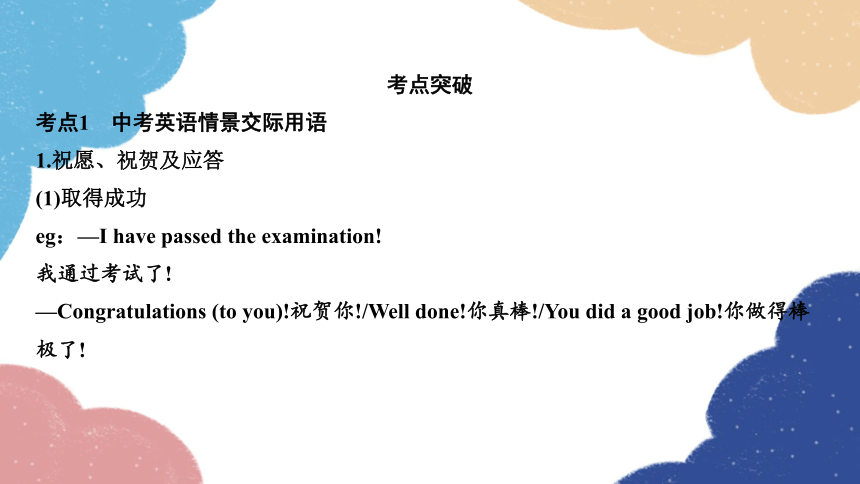
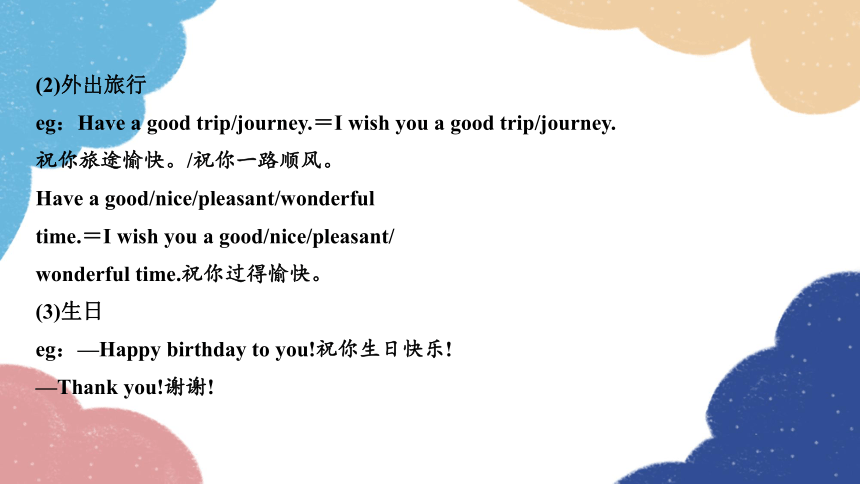
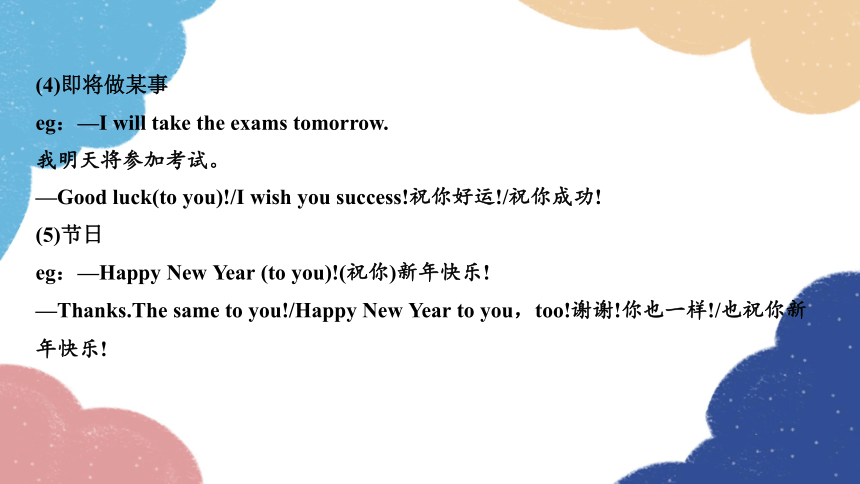
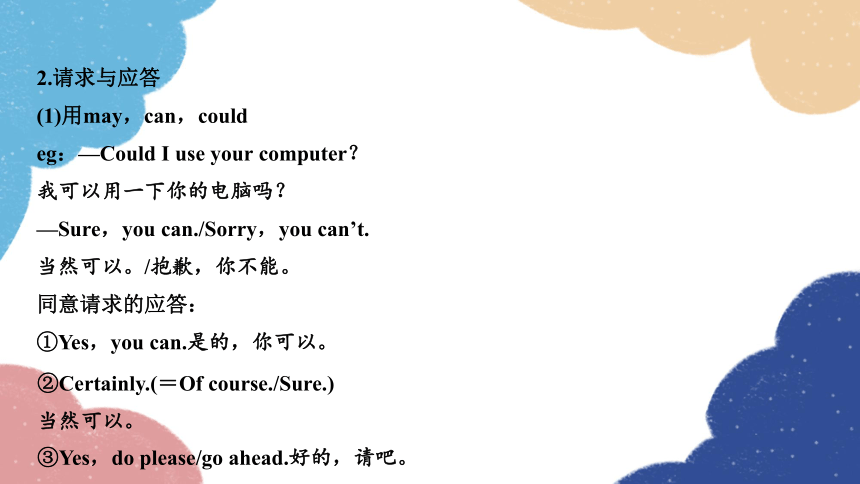
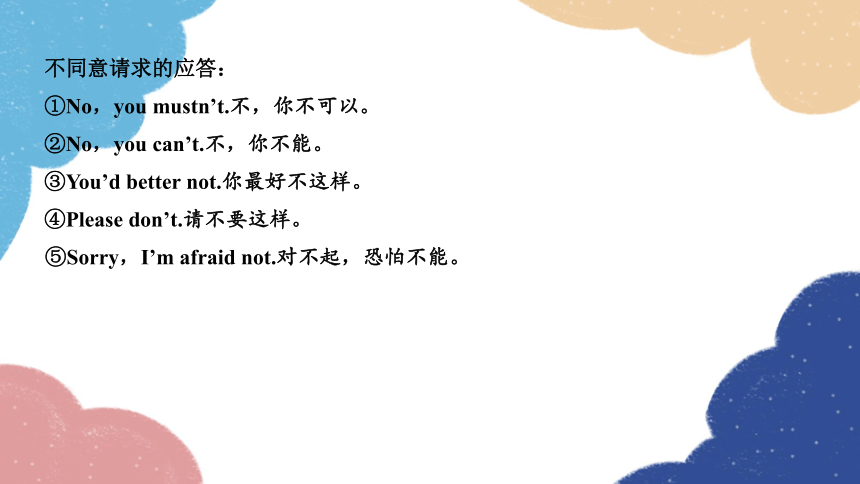
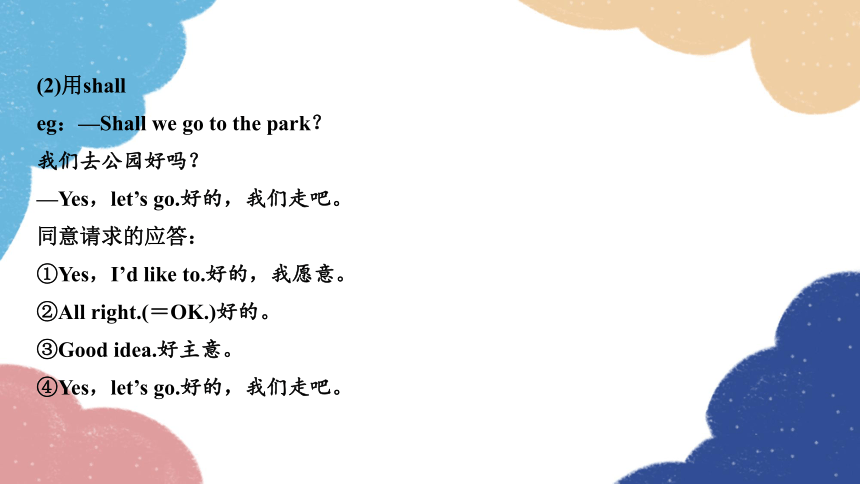
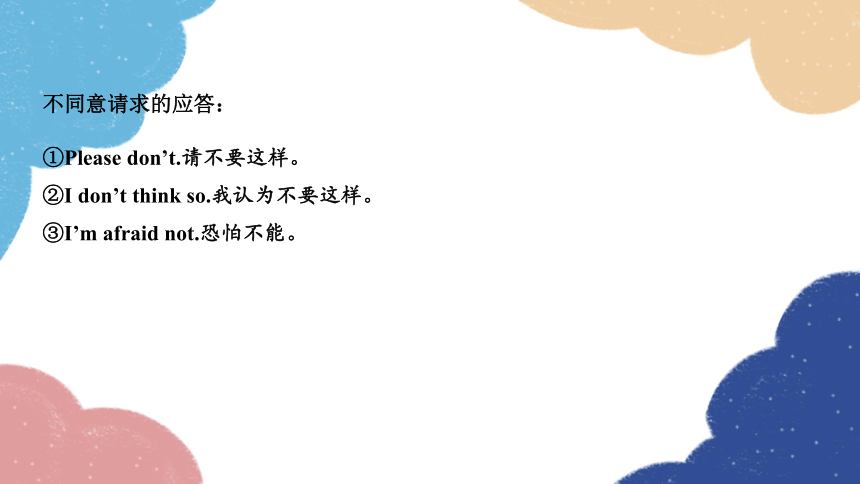
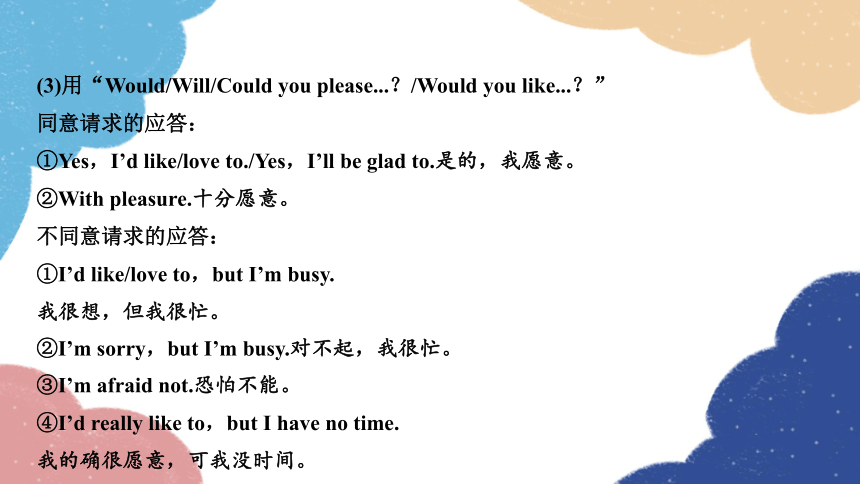

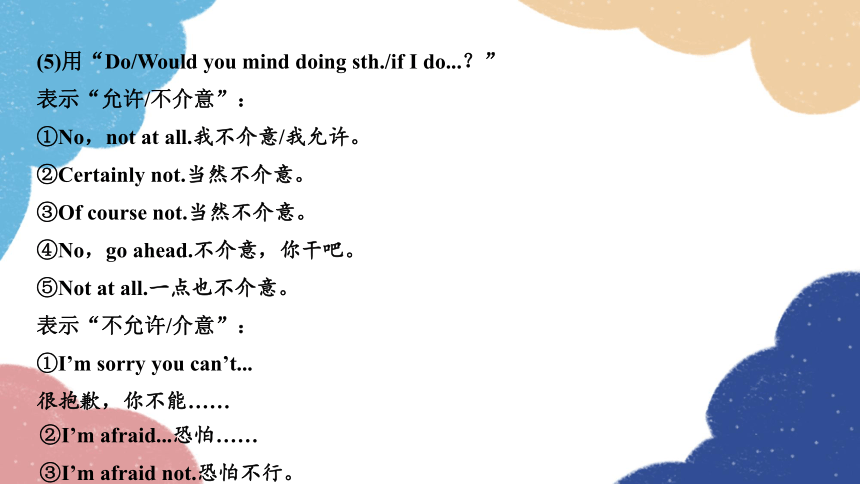
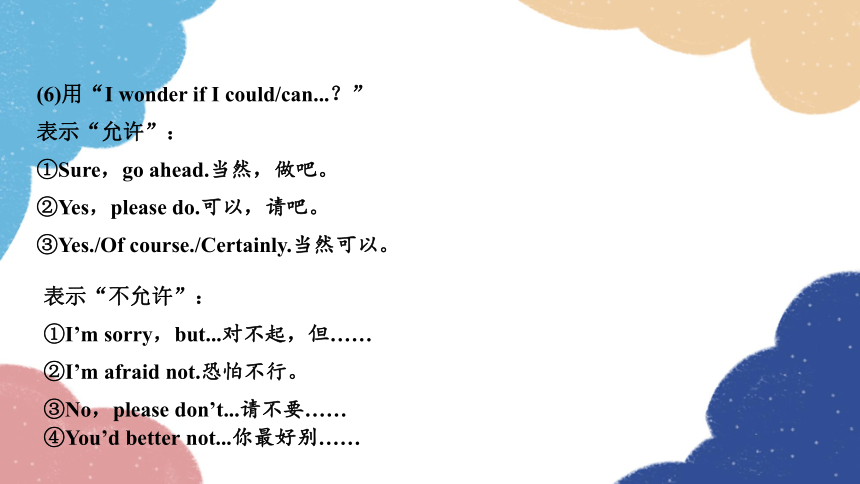
文档简介
(共43张PPT)
第十三课时 日常交际用语、谚语及跨学科综合知识
第二章
考点突破
考点1 中考英语情景交际用语
1.祝愿、祝贺及应答
(1)取得成功
eg:—I have passed the examination!
我通过考试了!
—Congratulations (to you)!祝贺你!/Well done!你真棒!/You did a good job!你做得棒极了!
(2)外出旅行
eg:Have a good trip/journey.=I wish you a good trip/journey.
祝你旅途愉快。/祝你一路顺风。
Have a good/nice/pleasant/wonderful
time.=I wish you a good/nice/pleasant/
wonderful time.祝你过得愉快。
(3)生日
eg:—Happy birthday to you!祝你生日快乐!
—Thank you!谢谢!
(4)即将做某事
eg:—I will take the exams tomorrow.
我明天将参加考试。
—Good luck(to you)!/I wish you success!祝你好运!/祝你成功!
(5)节日
eg:—Happy New Year (to you)!(祝你)新年快乐!
—Thanks.The same to you!/Happy New Year to you,too!谢谢!你也一样!/也祝你新年快乐!
2.请求与应答
(1)用may,can,could
eg:—Could I use your computer?
我可以用一下你的电脑吗?
—Sure,you can./Sorry,you can’t.
当然可以。/抱歉,你不能。
同意请求的应答:
①Yes,you can.是的,你可以。
②Certainly.(=Of course./Sure.)
当然可以。
③Yes,do please/go ahead.好的,请吧。
不同意请求的应答:
①No,you mustn’t.不,你不可以。
②No,you can’t.不,你不能。
③You’d better not.你最好不这样。
④Please don’t.请不要这样。
⑤Sorry,I’m afraid not.对不起,恐怕不能。
(2)用shall
eg:—Shall we go to the park?
我们去公园好吗?
—Yes,let’s go.好的,我们走吧。
同意请求的应答:
①Yes,I’d like to.好的,我愿意。
②All right.(=OK.)好的。
③Good idea.好主意。
④Yes,let’s go.好的,我们走吧。
不同意请求的应答:
①Please don’t.请不要这样。
②I don’t think so.我认为不要这样。
③I’m afraid not.恐怕不能。
(3)用“Would/Will/Could you please...?/Would you like...?”
同意请求的应答:
①Yes,I’d like/love to./Yes,I’ll be glad to.是的,我愿意。
②With pleasure.十分愿意。
不同意请求的应答:
①I’d like/love to,but I’m busy.
我很想,但我很忙。
②I’m sorry,but I’m busy.对不起,我很忙。
③I’m afraid not.恐怕不能。
④I’d really like to,but I have no time.
我的确很愿意,可我没时间。
(4)用please
eg:Please come to my birthday party this weekend!这周末请来我的生日聚会吧!
同意请求的应答:
①OK./All right./By all means./You bet.好的。
②Of course./Sure./Certainly.当然可以。
③With pleasure.十分愿意。
不同意请求的应答:
①I’m sorry,but I’m busy.对不起,我很忙。
②I’m afraid not.恐怕不行。
(5)用“Do/Would you mind doing sth./if I do...?”
表示“允许/不介意”:
①No,not at all.我不介意/我允许。
②Certainly not.当然不介意。
③Of course not.当然不介意。
④No,go ahead.不介意,你干吧。
⑤Not at all.一点也不介意。
表示“不允许/介意”:
①I’m sorry you can’t...
很抱歉,你不能……
②I’m afraid...恐怕……
③I’m afraid not.恐怕不行。
(6)用“I wonder if I could/can...?”
表示“允许”:
①Sure,go ahead.当然,做吧。
②Yes,please do.可以,请吧。
③Yes./Of course./Certainly.当然可以。
④You’d better not...你最好别……
表示“不允许”:
①I’m sorry,but...对不起,但……
②I’m afraid not.恐怕不行。
③No,please don’t...请不要……
3.感谢与应答
(1)表达感谢
①Thank you!/Thanks!谢谢!
②Thanks a million!万分感谢!
③It’s really nice/kind of you.你真好。
(2)如果别人想为你办事,可你觉得不必麻烦他,或者别人替你办事没有办成但你还要感谢他,这时你可以说:
①Thank you all the same.同样得感谢你。
②It’s most thoughtful of you!你想得真周到!
①You’re welcome.不客气。
②Not at all.没事儿。
③Don’t mention it.不用了。
④It’s my pleasure.我很乐意。
⑤No trouble at all.一点也不麻烦。
⑥It was the least I could do.
这是我应该做的。
(3)回答别人的感谢
⑨I’m delighted to have been able to do that for you.能为你效劳我很高兴。
⑩It’s really nothing.算不了什么,不用谢。
⑦I’m glad I could do it.
我很高兴能这么做。
⑧That’s all right./That’s OK.
没关系,不用谢。
4.邀请与应答
(1)用一般疑问句形式
①“Will/Would/Can/Could you come to...?”表示“请您来……好吗?”,被邀请人接受的可能性较大。
eg:Will you come to my party?
你来参加我的聚会好吗?
②“Would you like+名词(代词)/不定式/sb.+不定式?”表示“您愿意……?/你是否愿意……?”,此时邀请人不知对方是否接受邀请,是商量、询问及试探性的邀请、请求或表示个人的想法、看法。
eg:—Would you like something to drink?
你想喝点什么吗?
—Yes,please.嗯,请拿来吧。/No,thanks.
不用了,谢谢。
—Would you like to go there with him?你愿意与他一道去那儿吗?
—Yes/Sure,I’d like/love to.好的,我愿意。
类似肯定表达法:
Yes,I’d be happy to.好的,我很乐意。
Yes,it’s very kind/nice of you to invite me.好的,谢谢您邀请我。
Yes,it’s very kind of you.Thanks.
真是太好了,谢谢。
(2)用陈述句形式
“I’d like sb.to do sth./I’d like you to come to...”是向某人发出邀请的常见句式,表示“希望(想叫)某人做某事”,常与would连用,是一种客气的邀请。
eg:—I’d like you to see a film with me.我想请你和我一起去看电影。
—I’d like/love to,but I’m very busy.
我很想去,但我很忙。
类似委婉拒绝表达法:
I’d love to...,but I’m afraid...
我想去……但恐怕……
Thank you for inviting me/It’s very kind of you to invite me,but I’m busy.
谢谢你邀请我,但我很忙。
5.道歉和应答
(1)道歉
①Excuse me for...请原谅我……
②Pardon me for...请原谅我……
③I’m really sorry for...
我真为……感到抱歉。
④I’m awfully sorry.I don’t mean to...
我非常抱歉,我无意……
⑤I’m so sorry.It’s all my fault.
我十分抱歉,都是我的过错。
⑥I’m terribly sorry about...
我对……非常抱歉。
⑦I hope you’ll pardon me for...
希望你能原谅我……
(2)道歉的回答
①Never mind,it doesn’t matter.
没关系,不要紧。
②Please don’t worry about it.
请别为这事担心。
③It’s nothing serious.没有什么关系。
④That’s all right./That’s OK.没关系。
⑤Forget it.算了。
6.劝告和建议
(1)劝告和建议
①You’d better (not) do sth.你最好(不)要……
②You should do sth.你应该……
③You need (to) do sth.你需要……
④Why don’t you do sth.?为什么不……?
⑤Why not do sth.?为什么不……?
⑥What/How about+名词或动名词...?……怎么样?
⑦Shall we...?我们……好吗?
⑧Let’s do sth.我们做某事吧。
①Great.太好了。
②That sounds good.听起来不错。
③That’s a good idea.真是个好主意。
(3)表示不同意
①I’m afraid that...
我担心……/我恐怕……
②I’m afraid not.恐怕不行。
(2)表示同意常用的答语
7.打电话
(1)电话拨通后相互打招呼
①Hello!Is that...speaking?你好!你是……吗?
②Who is that speaking?你是谁?
③Who is speaking/calling,please?你是谁?
应答
①Yes,(this is)...speaking.
是的,我是……
②Yes,it’s...here.是的,我是……
(2)打电话请对方找人或留言
①Is...in/at home?……在家吗?
②Can/May/Could I speak to...,please?请找……接电话,好吗?
③Will/Would you give a message to...,please?请给……捎个口信,好吗?
④Would you tell him my telephone number,please?请你把我的电话号码告诉他,好吗?
⑤Can/Could you ask...to ring me back,please?请叫……给我回个电话,好吗?
应答
①Hold on.稍等。
②Wait a minute.稍等。
③One moment,please.请等一等。
④I’m sorry...is not in/at home now.对不起,……现在不在。
⑤Can I take a message?我能给捎个口信吗?
⑥I’ll ask him to call you back.我会让他给你回电话的。
8.就餐
(1)就餐时,当主人询问客人想吃/喝点什么时
①Would you like sth.(to eat/drink)?你想吃/喝点……吗?
②What would you like to eat/drink?你想要吃/喝点什么?
③Would you like some more...?你还要点……吗?
④How about (some more)...?(再)来点……怎么样?
(2)就餐时,当主人主动请客人吃/喝点东西时
①Help yourself/yourselves to...随便吃/喝点……吧。
②Let me give you...让我来给你……吧。
③Make yourself at home.请随便吃,不要客气。
①Yes,please.好的。
②I’d like...我想来点……
③Well,just a little,please.好的,请来一点儿。
(4)当客人表示不想吃/喝东西或表示已经吃饱/喝好了时
①No,thanks.谢谢,不要了。
②Thank you.I’ve had enough.谢谢,我已经够了。
③I’m full,thank you.谢谢,我吃饱了。
(3)当客人表示愿意或同意吃/喝点东西时
( D )①—Have you written anything on traditional Chinese food so far?
— I’ll work on it next Monday.
A.Yes,of course. B.Lucky you .
C.That’s for sure. D.Not yet.
D
( C )②—Would you mind my closing the door?It’s too cold outside.
— You can do it!
A.Certainly. B.You’d better not.
C.Of course not.
C
考点2 俗语谚语
1.No pain,no gain.一分耕耘,一分收获。
2.A friend in need is a friend indeed.
患难见真情。
3.Practice makes perfect.熟能生巧。
4.Actions speak louder than words.
事实胜于雄辩。(行动胜于言辞。)
5.The early bird catches the worm.
早起的鸟儿有虫吃。(捷足先登。)
6.Every dog has its day.凡人皆有得意日。
7.Many hands make light work.
众人拾柴火焰高。
8.It never rains but it pours.
祸不单行。(不雨则已,一雨倾盆。)
9.Put all your eggs in one basket.孤注一掷。
10.Burn the candle at both ends.精力耗尽。(蜡烛两头烧。)
11.The grass is always greener on the other side.这山望着那山高。
12.Better late than never.迟做总比不做好。
13.Better safe than sorry.谨言慎行不吃亏,轻率莽撞必后悔。
14.Too many cooks spoil the broth.人多添乱。(人多手杂反坏事。)
15.It’s never too old to learn.活到老,学到老。
16.Rome wasn’t built in a day.
罗马不是一天建成的。(万事都是不可能“一蹴而就”的。)
17.A miss is as good as a mile.
失之毫厘,谬以千里。
18.Well begun is half done.
好的开端是成功的一半。
19.Learn to walk before you run.
循序渐进/按部就班。(先学走,再学跑。)
20.Learn to fish but not just ask for fish.
授人以鱼不如授人以渔。
21.East or west,home is best.
金窝银窝不如自己的狗窝。
22.When the cat is away,the mice will play.山中无老虎,猴子称大王。
23.Don’t trouble trouble until trouble troubles you.不要自寻烦恼。
24.Never judge by appearances.
不要以貌取人。
25.It is never too late to mend.
亡羊补牢,犹时未晚。
26.Where there is a will,there is a way.
有志者,事竟成。
27.Great minds think alike.英雄所见略同。
28.He laughs best who laughs last.
谁笑到最后,谁笑得最美。
29.Think twice before acting.三思而后行。
30.Where there is life,there is hope.
留得青山在,不怕没柴烧。
31.All things are difficult before they are easy.万事开头难。(凡事必先难后易。)
①(2020·赤峰)独木不成林。
One tree can’t make a forest .
make
a
forest
( C )②(2022·扬州广陵区二模)—As Laozi’s book says,a thousand-mile journey begins with the first .
—Yes,let’s get started now!
A.try B.day C.step D.foot
C
考点3 跨学科综合知识
分析甘肃近年真题可知,跨学科综合题考查较多,需要考生在能够读懂英语题目的同时,综合运用多学科基础背景知识来答题。
( B )①(2022·泉州一模改编)—Have you read the stories of Lu Xun?
—Yes,he a pen to show the stories of that time.
A.took away B.picked up
C.gave up
B
( A )②(2022·海南)Look at the notice.It says .
A.We can’t swim with out a shower here
B.we can’t use the new shower
C.we can’t go to the pool
A
备考演练
单项选择
( C )1.(2022·常州二模)Yuan Longping made contribution to solving the Chinese people’s food problem set a monument to world peace and social progress.
A.either;or
B.not;but
C.not only;but also
D.both;as well
C
( C )2.(2022·常州二模)Zhong Nanshan together with thousands of doctors is still devoting himself the virus .There is still a long way to go.
A.to prevent;spread
B.to prevent;spreading
C.to preventing;from spreading
D.to preventing;spread
C
( C )3.(2022·安徽)—Cooking helps us show love for family members.
— .Every time I make dishes for Mom,she is very happy.
A.I can’t believe it
B.Take it easy
C.I couldn’t agree more
D.That depends
C
( C )4.(2022·牡丹江)— ?
—Wait a minute.I’ll go and call him in.
A.Are you Mr.White
B.Who’s speaking
C.May I speak to Mr.White,please
C
( C )5.(2022·鄂州)—Your English is very good.
— .
A.Yes,you are right
B.Yes,it’s my favorite
C.Thank you
D.Not good
C
( B )6.(2022·徐州)The saying“ ”tells us that effort is very important in everything.
A.It never rains but it pours
B.Nopain,nogain
C.A friend in need is a friend indeed
D.Every dog has its day
( B )7.(2022·江汉、天门)—Tom,turn off the light.Don’t keep it on.
— .
A.You’d better not B.OK.I will
C.Not at all D.You’re welcome
B
B
( C )8.(2022·龙东)Which sign means“Do not drink and drive.”?
A. B. C.
C
第十三课时 日常交际用语、谚语及跨学科综合知识
第二章
考点突破
考点1 中考英语情景交际用语
1.祝愿、祝贺及应答
(1)取得成功
eg:—I have passed the examination!
我通过考试了!
—Congratulations (to you)!祝贺你!/Well done!你真棒!/You did a good job!你做得棒极了!
(2)外出旅行
eg:Have a good trip/journey.=I wish you a good trip/journey.
祝你旅途愉快。/祝你一路顺风。
Have a good/nice/pleasant/wonderful
time.=I wish you a good/nice/pleasant/
wonderful time.祝你过得愉快。
(3)生日
eg:—Happy birthday to you!祝你生日快乐!
—Thank you!谢谢!
(4)即将做某事
eg:—I will take the exams tomorrow.
我明天将参加考试。
—Good luck(to you)!/I wish you success!祝你好运!/祝你成功!
(5)节日
eg:—Happy New Year (to you)!(祝你)新年快乐!
—Thanks.The same to you!/Happy New Year to you,too!谢谢!你也一样!/也祝你新年快乐!
2.请求与应答
(1)用may,can,could
eg:—Could I use your computer?
我可以用一下你的电脑吗?
—Sure,you can./Sorry,you can’t.
当然可以。/抱歉,你不能。
同意请求的应答:
①Yes,you can.是的,你可以。
②Certainly.(=Of course./Sure.)
当然可以。
③Yes,do please/go ahead.好的,请吧。
不同意请求的应答:
①No,you mustn’t.不,你不可以。
②No,you can’t.不,你不能。
③You’d better not.你最好不这样。
④Please don’t.请不要这样。
⑤Sorry,I’m afraid not.对不起,恐怕不能。
(2)用shall
eg:—Shall we go to the park?
我们去公园好吗?
—Yes,let’s go.好的,我们走吧。
同意请求的应答:
①Yes,I’d like to.好的,我愿意。
②All right.(=OK.)好的。
③Good idea.好主意。
④Yes,let’s go.好的,我们走吧。
不同意请求的应答:
①Please don’t.请不要这样。
②I don’t think so.我认为不要这样。
③I’m afraid not.恐怕不能。
(3)用“Would/Will/Could you please...?/Would you like...?”
同意请求的应答:
①Yes,I’d like/love to./Yes,I’ll be glad to.是的,我愿意。
②With pleasure.十分愿意。
不同意请求的应答:
①I’d like/love to,but I’m busy.
我很想,但我很忙。
②I’m sorry,but I’m busy.对不起,我很忙。
③I’m afraid not.恐怕不能。
④I’d really like to,but I have no time.
我的确很愿意,可我没时间。
(4)用please
eg:Please come to my birthday party this weekend!这周末请来我的生日聚会吧!
同意请求的应答:
①OK./All right./By all means./You bet.好的。
②Of course./Sure./Certainly.当然可以。
③With pleasure.十分愿意。
不同意请求的应答:
①I’m sorry,but I’m busy.对不起,我很忙。
②I’m afraid not.恐怕不行。
(5)用“Do/Would you mind doing sth./if I do...?”
表示“允许/不介意”:
①No,not at all.我不介意/我允许。
②Certainly not.当然不介意。
③Of course not.当然不介意。
④No,go ahead.不介意,你干吧。
⑤Not at all.一点也不介意。
表示“不允许/介意”:
①I’m sorry you can’t...
很抱歉,你不能……
②I’m afraid...恐怕……
③I’m afraid not.恐怕不行。
(6)用“I wonder if I could/can...?”
表示“允许”:
①Sure,go ahead.当然,做吧。
②Yes,please do.可以,请吧。
③Yes./Of course./Certainly.当然可以。
④You’d better not...你最好别……
表示“不允许”:
①I’m sorry,but...对不起,但……
②I’m afraid not.恐怕不行。
③No,please don’t...请不要……
3.感谢与应答
(1)表达感谢
①Thank you!/Thanks!谢谢!
②Thanks a million!万分感谢!
③It’s really nice/kind of you.你真好。
(2)如果别人想为你办事,可你觉得不必麻烦他,或者别人替你办事没有办成但你还要感谢他,这时你可以说:
①Thank you all the same.同样得感谢你。
②It’s most thoughtful of you!你想得真周到!
①You’re welcome.不客气。
②Not at all.没事儿。
③Don’t mention it.不用了。
④It’s my pleasure.我很乐意。
⑤No trouble at all.一点也不麻烦。
⑥It was the least I could do.
这是我应该做的。
(3)回答别人的感谢
⑨I’m delighted to have been able to do that for you.能为你效劳我很高兴。
⑩It’s really nothing.算不了什么,不用谢。
⑦I’m glad I could do it.
我很高兴能这么做。
⑧That’s all right./That’s OK.
没关系,不用谢。
4.邀请与应答
(1)用一般疑问句形式
①“Will/Would/Can/Could you come to...?”表示“请您来……好吗?”,被邀请人接受的可能性较大。
eg:Will you come to my party?
你来参加我的聚会好吗?
②“Would you like+名词(代词)/不定式/sb.+不定式?”表示“您愿意……?/你是否愿意……?”,此时邀请人不知对方是否接受邀请,是商量、询问及试探性的邀请、请求或表示个人的想法、看法。
eg:—Would you like something to drink?
你想喝点什么吗?
—Yes,please.嗯,请拿来吧。/No,thanks.
不用了,谢谢。
—Would you like to go there with him?你愿意与他一道去那儿吗?
—Yes/Sure,I’d like/love to.好的,我愿意。
类似肯定表达法:
Yes,I’d be happy to.好的,我很乐意。
Yes,it’s very kind/nice of you to invite me.好的,谢谢您邀请我。
Yes,it’s very kind of you.Thanks.
真是太好了,谢谢。
(2)用陈述句形式
“I’d like sb.to do sth./I’d like you to come to...”是向某人发出邀请的常见句式,表示“希望(想叫)某人做某事”,常与would连用,是一种客气的邀请。
eg:—I’d like you to see a film with me.我想请你和我一起去看电影。
—I’d like/love to,but I’m very busy.
我很想去,但我很忙。
类似委婉拒绝表达法:
I’d love to...,but I’m afraid...
我想去……但恐怕……
Thank you for inviting me/It’s very kind of you to invite me,but I’m busy.
谢谢你邀请我,但我很忙。
5.道歉和应答
(1)道歉
①Excuse me for...请原谅我……
②Pardon me for...请原谅我……
③I’m really sorry for...
我真为……感到抱歉。
④I’m awfully sorry.I don’t mean to...
我非常抱歉,我无意……
⑤I’m so sorry.It’s all my fault.
我十分抱歉,都是我的过错。
⑥I’m terribly sorry about...
我对……非常抱歉。
⑦I hope you’ll pardon me for...
希望你能原谅我……
(2)道歉的回答
①Never mind,it doesn’t matter.
没关系,不要紧。
②Please don’t worry about it.
请别为这事担心。
③It’s nothing serious.没有什么关系。
④That’s all right./That’s OK.没关系。
⑤Forget it.算了。
6.劝告和建议
(1)劝告和建议
①You’d better (not) do sth.你最好(不)要……
②You should do sth.你应该……
③You need (to) do sth.你需要……
④Why don’t you do sth.?为什么不……?
⑤Why not do sth.?为什么不……?
⑥What/How about+名词或动名词...?……怎么样?
⑦Shall we...?我们……好吗?
⑧Let’s do sth.我们做某事吧。
①Great.太好了。
②That sounds good.听起来不错。
③That’s a good idea.真是个好主意。
(3)表示不同意
①I’m afraid that...
我担心……/我恐怕……
②I’m afraid not.恐怕不行。
(2)表示同意常用的答语
7.打电话
(1)电话拨通后相互打招呼
①Hello!Is that...speaking?你好!你是……吗?
②Who is that speaking?你是谁?
③Who is speaking/calling,please?你是谁?
应答
①Yes,(this is)...speaking.
是的,我是……
②Yes,it’s...here.是的,我是……
(2)打电话请对方找人或留言
①Is...in/at home?……在家吗?
②Can/May/Could I speak to...,please?请找……接电话,好吗?
③Will/Would you give a message to...,please?请给……捎个口信,好吗?
④Would you tell him my telephone number,please?请你把我的电话号码告诉他,好吗?
⑤Can/Could you ask...to ring me back,please?请叫……给我回个电话,好吗?
应答
①Hold on.稍等。
②Wait a minute.稍等。
③One moment,please.请等一等。
④I’m sorry...is not in/at home now.对不起,……现在不在。
⑤Can I take a message?我能给捎个口信吗?
⑥I’ll ask him to call you back.我会让他给你回电话的。
8.就餐
(1)就餐时,当主人询问客人想吃/喝点什么时
①Would you like sth.(to eat/drink)?你想吃/喝点……吗?
②What would you like to eat/drink?你想要吃/喝点什么?
③Would you like some more...?你还要点……吗?
④How about (some more)...?(再)来点……怎么样?
(2)就餐时,当主人主动请客人吃/喝点东西时
①Help yourself/yourselves to...随便吃/喝点……吧。
②Let me give you...让我来给你……吧。
③Make yourself at home.请随便吃,不要客气。
①Yes,please.好的。
②I’d like...我想来点……
③Well,just a little,please.好的,请来一点儿。
(4)当客人表示不想吃/喝东西或表示已经吃饱/喝好了时
①No,thanks.谢谢,不要了。
②Thank you.I’ve had enough.谢谢,我已经够了。
③I’m full,thank you.谢谢,我吃饱了。
(3)当客人表示愿意或同意吃/喝点东西时
( D )①—Have you written anything on traditional Chinese food so far?
— I’ll work on it next Monday.
A.Yes,of course. B.Lucky you .
C.That’s for sure. D.Not yet.
D
( C )②—Would you mind my closing the door?It’s too cold outside.
— You can do it!
A.Certainly. B.You’d better not.
C.Of course not.
C
考点2 俗语谚语
1.No pain,no gain.一分耕耘,一分收获。
2.A friend in need is a friend indeed.
患难见真情。
3.Practice makes perfect.熟能生巧。
4.Actions speak louder than words.
事实胜于雄辩。(行动胜于言辞。)
5.The early bird catches the worm.
早起的鸟儿有虫吃。(捷足先登。)
6.Every dog has its day.凡人皆有得意日。
7.Many hands make light work.
众人拾柴火焰高。
8.It never rains but it pours.
祸不单行。(不雨则已,一雨倾盆。)
9.Put all your eggs in one basket.孤注一掷。
10.Burn the candle at both ends.精力耗尽。(蜡烛两头烧。)
11.The grass is always greener on the other side.这山望着那山高。
12.Better late than never.迟做总比不做好。
13.Better safe than sorry.谨言慎行不吃亏,轻率莽撞必后悔。
14.Too many cooks spoil the broth.人多添乱。(人多手杂反坏事。)
15.It’s never too old to learn.活到老,学到老。
16.Rome wasn’t built in a day.
罗马不是一天建成的。(万事都是不可能“一蹴而就”的。)
17.A miss is as good as a mile.
失之毫厘,谬以千里。
18.Well begun is half done.
好的开端是成功的一半。
19.Learn to walk before you run.
循序渐进/按部就班。(先学走,再学跑。)
20.Learn to fish but not just ask for fish.
授人以鱼不如授人以渔。
21.East or west,home is best.
金窝银窝不如自己的狗窝。
22.When the cat is away,the mice will play.山中无老虎,猴子称大王。
23.Don’t trouble trouble until trouble troubles you.不要自寻烦恼。
24.Never judge by appearances.
不要以貌取人。
25.It is never too late to mend.
亡羊补牢,犹时未晚。
26.Where there is a will,there is a way.
有志者,事竟成。
27.Great minds think alike.英雄所见略同。
28.He laughs best who laughs last.
谁笑到最后,谁笑得最美。
29.Think twice before acting.三思而后行。
30.Where there is life,there is hope.
留得青山在,不怕没柴烧。
31.All things are difficult before they are easy.万事开头难。(凡事必先难后易。)
①(2020·赤峰)独木不成林。
One tree can’t make a forest .
make
a
forest
( C )②(2022·扬州广陵区二模)—As Laozi’s book says,a thousand-mile journey begins with the first .
—Yes,let’s get started now!
A.try B.day C.step D.foot
C
考点3 跨学科综合知识
分析甘肃近年真题可知,跨学科综合题考查较多,需要考生在能够读懂英语题目的同时,综合运用多学科基础背景知识来答题。
( B )①(2022·泉州一模改编)—Have you read the stories of Lu Xun?
—Yes,he a pen to show the stories of that time.
A.took away B.picked up
C.gave up
B
( A )②(2022·海南)Look at the notice.It says .
A.We can’t swim with out a shower here
B.we can’t use the new shower
C.we can’t go to the pool
A
备考演练
单项选择
( C )1.(2022·常州二模)Yuan Longping made contribution to solving the Chinese people’s food problem set a monument to world peace and social progress.
A.either;or
B.not;but
C.not only;but also
D.both;as well
C
( C )2.(2022·常州二模)Zhong Nanshan together with thousands of doctors is still devoting himself the virus .There is still a long way to go.
A.to prevent;spread
B.to prevent;spreading
C.to preventing;from spreading
D.to preventing;spread
C
( C )3.(2022·安徽)—Cooking helps us show love for family members.
— .Every time I make dishes for Mom,she is very happy.
A.I can’t believe it
B.Take it easy
C.I couldn’t agree more
D.That depends
C
( C )4.(2022·牡丹江)— ?
—Wait a minute.I’ll go and call him in.
A.Are you Mr.White
B.Who’s speaking
C.May I speak to Mr.White,please
C
( C )5.(2022·鄂州)—Your English is very good.
— .
A.Yes,you are right
B.Yes,it’s my favorite
C.Thank you
D.Not good
C
( B )6.(2022·徐州)The saying“ ”tells us that effort is very important in everything.
A.It never rains but it pours
B.Nopain,nogain
C.A friend in need is a friend indeed
D.Every dog has its day
( B )7.(2022·江汉、天门)—Tom,turn off the light.Don’t keep it on.
— .
A.You’d better not B.OK.I will
C.Not at all D.You’re welcome
B
B
( C )8.(2022·龙东)Which sign means“Do not drink and drive.”?
A. B. C.
C
同课章节目录
- 词法
- 名词
- 动词和动词短语
- 动词语态
- 动词时态
- 助动词和情态动词
- 非谓语动词
- 冠词
- 代词
- 数词和量词
- 形容词副词及其比较等级
- 介词和介词短语
- 连词和感叹词
- 构词法
- 相似、相近词比较
- 句法
- 陈述句
- 一般疑问句和否定疑问句
- 特殊疑问句及选择疑问句
- 反意疑问句
- 存在句(There be句型)
- 宾语从句
- 定语从句
- 状语从句
- 主谓一致问题
- 简单句
- 并列句
- 复合句
- 主谓一致
- 主、表语从句
- 名词性从句
- 直接引语和间接引语
- 虚拟语气
- 感叹句
- 强调句
- 倒装句
- 祈使句
- 句子的成分
- 句子的分类
- 题型专区
- 单项选择部分
- 易错题
- 完形填空
- 阅读理解
- 词汇练习
- 听说训练
- 句型转换
- 补全对话
- 短文改错
- 翻译
- 书面表达
- 任务型阅读
- 语法填空
- 其他资料
